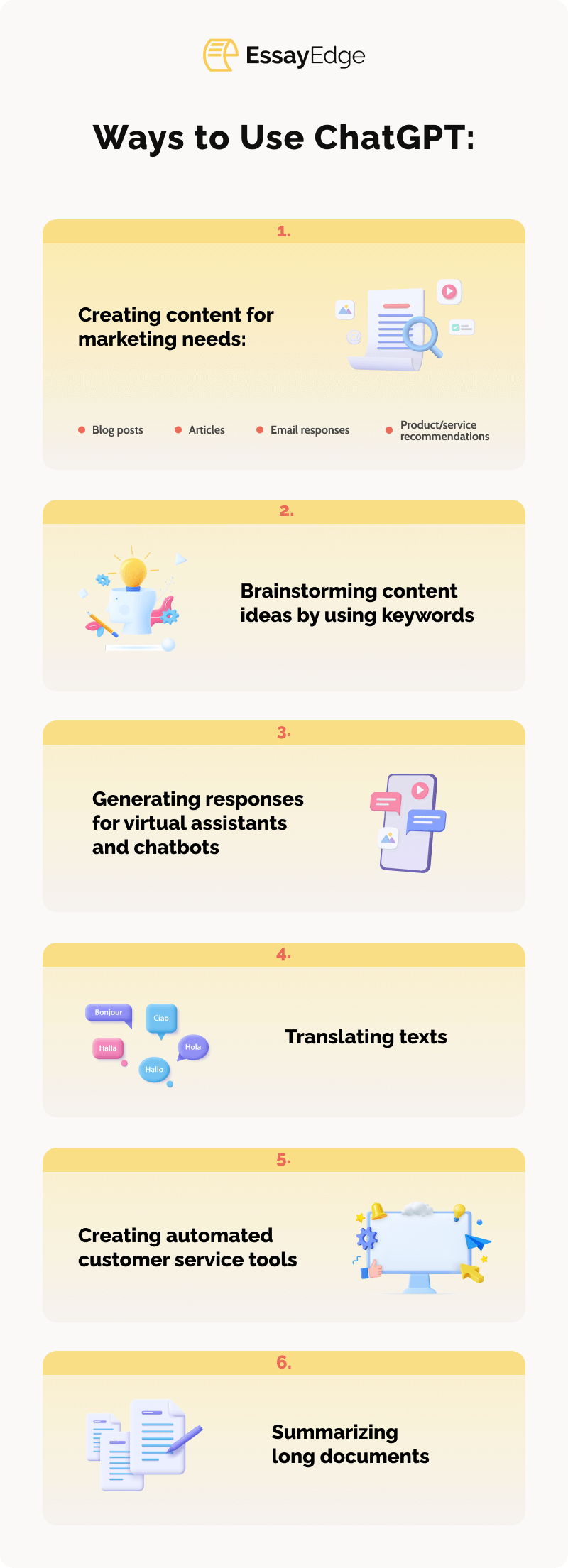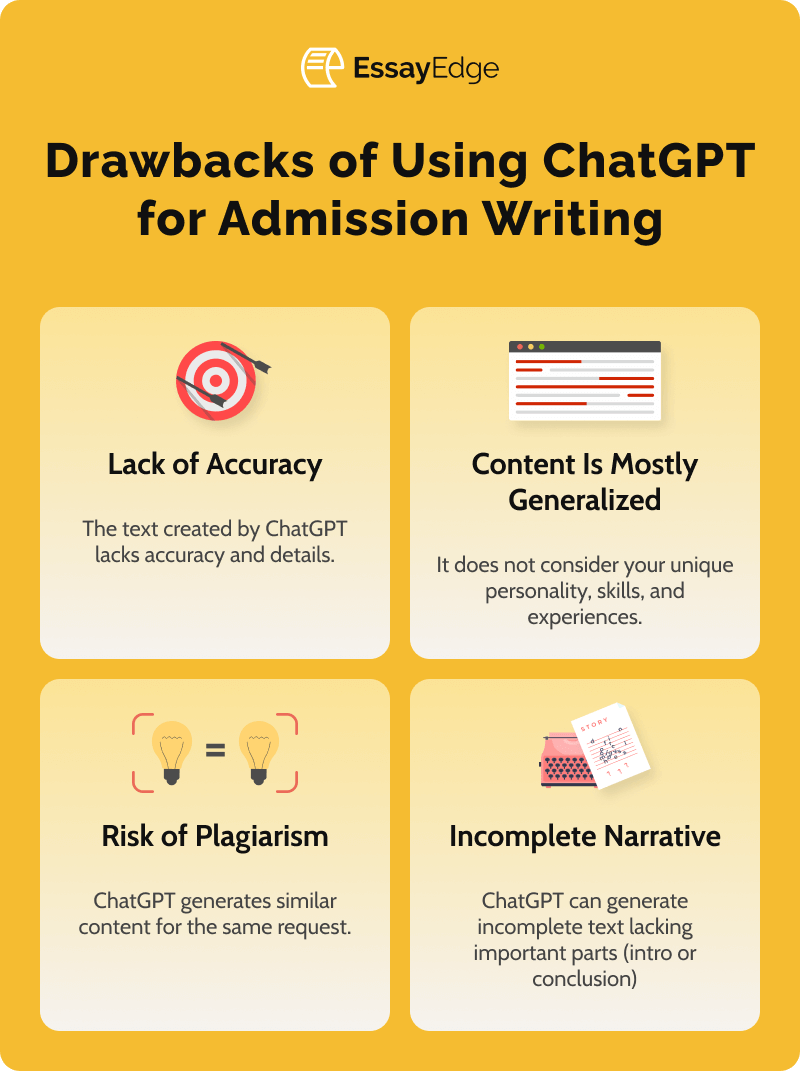Start Your Essay?
Our research showed that generating content via ChatGPT is illegal for these purposes, and we are going to show you why. Still, if you need to increase your chances of application, you can make your essay look brilliant with the help of an expert admission editing service in a legal way.
Table of Contents:
What Is ChatGPT?
Chat Generative Pre-Trained Transformer, mainly known as ChatGPT, is a text-based chatbot launched by OpenAI. This revolutionary tool provides responses to typed questions in a human-like form. The large language model chatbot is capable of interacting with humans in a dialogue-conversation manner.
How Does ChatGPT AI Actually Work?
Large language models are usually trained with a vast amount of data, enabling them to predict the next word. This ability makes it capable of writing sentences and even paragraphs of text. But ChatGPT goes beyond this method of training.
OpenAI applies an innovative technology called Reinforcement Learning with Human Feedback to make the responses more human-like. As a result, the next-gen chat is able not only to provide responses but also to generate various content good enough to use for marketing, email, and customer support needs.
Main Benefits You Get When Use ChatGPT
ChatGPT has a large number of benefits. First, it can be used as a super productive search engine. Still, the algorithm for giving responses differs from what we all used to perceive. It does not search the Internet. Instead, the innovative chatbot gathers a wide range of learned information by training on data and transforming it into a response. Perhaps, it will replace well-known search engines very soon.
ChatGPT can be applied in various fields, including online shopping, customer service, and hiring and training staff. Moreover, interactive storytelling experiences enable it to generate content. Here are more examples of possible ChatGPT application:
This artificial intelligence tool can be successfully used in the sphere of education, with benefits for both educators and students:
How Students Are Using ChatGPT Legally and Ethically
ChatGPT, when used responsibly, can be a helpful companion in the document-writing process. Many students leverage AI for brainstorming ideas, generating outlines, or improving sentence structure and grammar. For instance, students often use ChatGPT to spark ideas for common app essay introductions or to refine complex thoughts into simpler, clearer expressions. These uses are legal and ethical because they enhance, rather than replace, the student’s own creativity and effort.
ChatGPT also helps users explore diverse perspectives on a topic or test different approaches to organizing their paper. However, even when used for brainstorming, it’s crucial to ensure the final content reflects the writer’s authentic voice and experiences. A good college admissions composition is deeply personal, and no AI can replicate the nuances of human reflection and storytelling.
To ensure ethical usage:
- Use ChatGPT for generating ideas or finding synonyms, but always write the content in your own voice to preserve its uniqueness.
- Cross-check AI suggestions for accuracy, as ChatGPT may provide incorrect or misleading information.
- Avoid using AI to write entire sections of your document, as this could lead to plagiarism concerns or content that fails to resonate with admissions officers.
By treating AI as a supplementary tool, students can strike a balance between leveraging technology and staying true to their own narratives.
Major Risks of ChatGPT for College: How Can It Reduce Your Admission Chances?
Educators raised the alarm about the disruptive effect of ChatGPT on the learning process. For instance, the NYC Department of Education has already banned the next-gen chatbot from public school networks and devices. But what is the cause of such a sharp reaction?
First of all, high school students can use it for cheating as ChatGPT provides a quick and thorough response. So, they do not even need to look through the number of search results to get the most relevant one. But the real threat is the damage to critical thinking, problem-solving, brainstorming, and writing skills. Finally, the safety and accuracy of content concerns raise worries among educators.
However, not everyone supports these regulations. The opponents believe it’s better not to ban it but to find beneficial ways of using AI technologies for pedagogical purposes. Anyway, the student will have the opportunity to use this tool via their personal devices. For instance, researchers from the University of Texas claim that it’s possible to implement AI tools to raise genre awareness, writing style, and content revision skills.
On the whole, using ChatGPT for preparing academic or admission papers violates academic integrity principles, as it can be regarded as cheating. Moreover, it can reduce your chances of application because there is a risk of plagiarism.
Why Is It Better to Apply Your Own Writing Skills?
Undoubtedly, every applicant wants to craft the best possible personal essay to increase the chance of entering the desired institution. That’s why many of them are ready to take such extreme measures as ai-generated college admission documents.
At first glance, this idea looks brilliant. Fewer efforts, free service, fast results—everything sounds great. So, why shouldn’t you benefit from this innovative method of “writing”? Still, it’s not as simple as it seems. So, let’s figure out the risks.
- Generalized Content:
ChatGPT’s content is mostly generalized, lacking the depth and uniqueness that highlight an applicant’s individuality. Only you can provide specific details about your background, skills, experiences, and self-reflection which AI cannot accurately represent. - Plagiarism Risks:
Let’s imagine the hypothetical situation that several applicants use ChatGPT to help and make similar requests to write an “outstanding personal statement.” Since ChatGPT generates responses based on patterns in its training data, similar requests from different users often result in nearly identical content. This could lead to plagiarism issues, jeopardizing your application. - Narrative Incompleteness:
Users often find that ChatGPT struggles with coherent introductions and conclusions, leaving texts feeling incomplete or disjointed. When you use ChatGPT it can cause difficulty with making introductions and drawing summaries. So, it can negatively affect the structure and format. Moreover, you can make a lot of effort trying to complete it or improve the quality of the AI-generated content. - Accuracy Concerns:
ChatGPT faces problems with creating accurate and detailed content. It’s related to the way it responds to the request. It tries to predict what word should come next in the sentence or paragraph. So, the text can have some inaccuracies, while the college admissions essay requires high quality, logical order, and concrete details..
Admission paper is your chance to win the committee’s heart and enter your dream university. But what makes your admission paper work for your success and win the application process? The answer is very simple—it should be personal and highlight your uniqueness among the crowd of competitors.
Still, the content produced by AI like ChatGPT is quite far from originality and highlights personality uniqueness. So, the question comes to mind: “Is it worth taking a risk?” Because in the end, you won’t get what you’ve expected.
Anyway, the task to write an essay for application on your own implies original and personalized content and confidence that you’ve done your best to win the competition. Even if you have doubts about your writing skills, professional editing and proofreading will help you clear up all the doubts. Together with a feeling of confidence, you’ll boost your chances for successful admission.
Use AI Detection Tools for Personal Statement: A Growing Challenge
As AI tools like ChatGPT become more popular, universities are responding with advanced technologies to detect AI-generated content in admissions papers. AI detectors analyze sentence structures, grammar choices, and content flow to spot inconsistencies that might not align with human writing.
Institutions justify these measures by emphasizing the importance of authenticity in admissions documents. Personal statements are more than a writing exercise—they’re a window into the applicant’s character, values, and aspirations. Documents flagged as AI-generated risk being rejected or requiring further clarification, putting the applicant’s candidacy in jeopardy.
To navigate this challenge:
- Write college papers authentically, drawing on your own life experiences and insights.
- Use AI tools sparingly, focusing on minor refinements rather than full content generation.
- Stay informed about the AI policies of your target schools, as these vary and can impact your application strategy.
By adhering to these practices, students can ensure their writing remain genuine and compelling while avoiding potential pitfalls with AI detection tools.
Why Human Editors Are Irreplaceable for Essay Writing
While AI tools like ChatGPT offer some convenience, nothing compares to the expertise and insight of a professional human admission paper editor. Admissions essays require a nuanced understanding of storytelling, tone, and structure—qualities that even the most advanced AI cannot replicate. A professional editor doesn’t just fix grammar and syntax; they help craft a narrative that highlights the applicant’s unique qualities and aligns with the expectations of admissions committees.
Professional editors bring a level of personalization that AI lacks. They can:
- Help identify the most compelling aspects of an applicant’s experiences and frame them effectively.
- Provide tailored advice on how to refine the writing tone and voice to make it resonate with admissions officers.
- Offer insights based on years of experience with university admissions, ensuring the document meets institutional standards.
Moreover, tutors or human editors understand the subtleties of different prompts and can guide students in addressing them directly. They also ensure that the essay avoids common pitfalls, such as overgeneralizations or clichés, which can dilute its impact.
While AI might be a helpful starting point, only a human editor can transform a good personal statement into an extraordinary one—giving students the best chance of standing out in a competitive admissions process.
Use ChatGPT to Help With Admissions: Final Thoughts
Undoubtedly, ChatGPT made a revolution in understanding AI and its potential. Regardless of its tremendous benefits, AI may still controversial for many reasons, especially in terms of its usage. By considering its capability to generate written content, it can cause a serious threat to academic integrity. But whether it does more harm than good, only time will tell.
Anyway, you shouldn’t use ChatGPT, the same as any other essay writing service, which is regarded as a violation of academic integrity principles and admission rules. Cheating is cheating, no matter what tool you implement for this purpose. So, using it for crafting admission or academic papers is definitely a bad idea. Instead, you can write college statement on your own and rely on the expert help of editing and proofreading gurus to ensure the highest quality of your texts.



